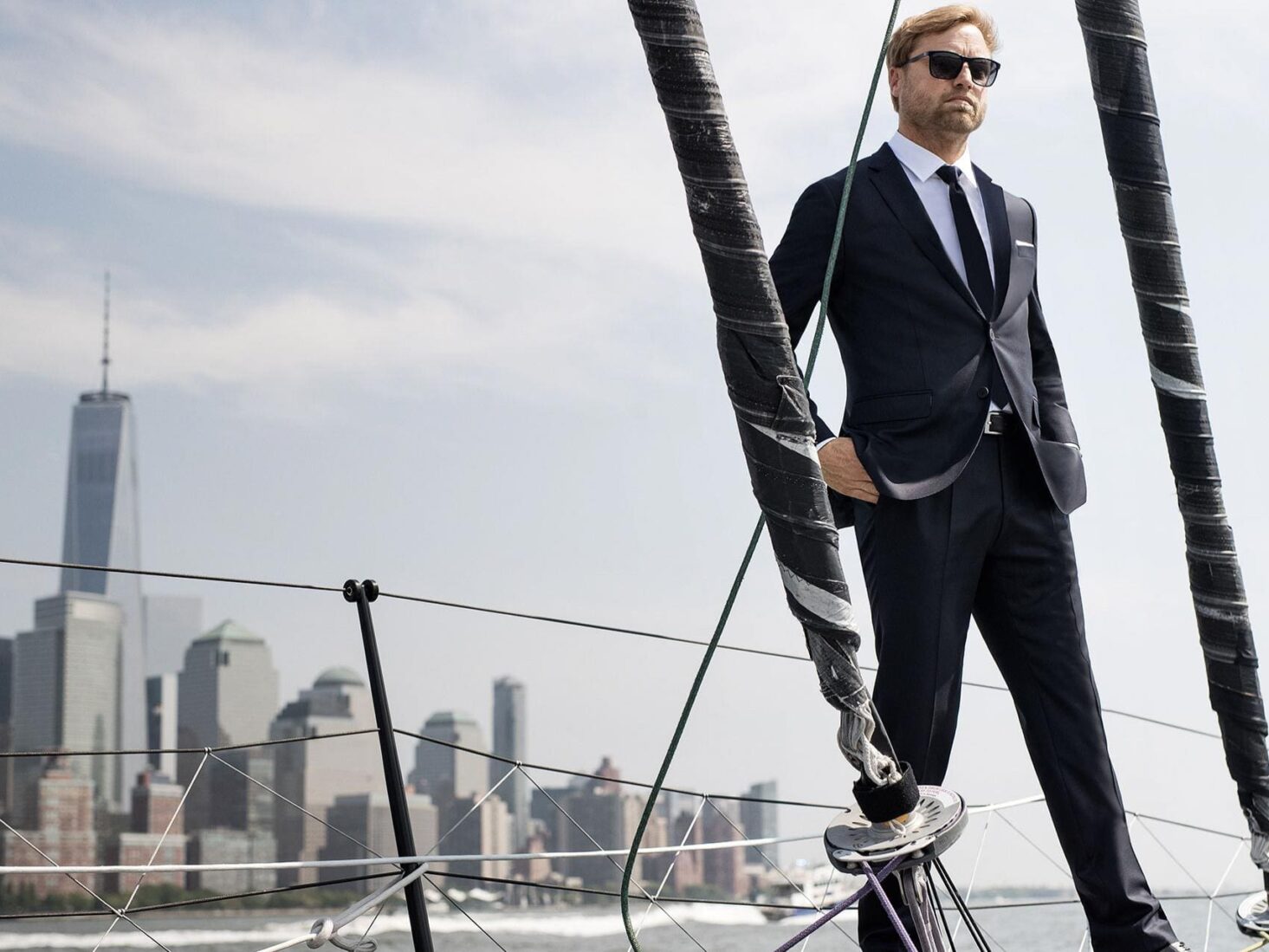
British Yachtsman Alex Thomson: Sailing Stunts & Life on the High Seas
"There are incredible stories, like the guy who bit his tongue off during a race and had to sew it back on."
“It doesn’t compute in my brain to give up,” says Alex Thomson, solo non-stop round-the-world yachtsman. Thomson has probably been more tempted than most of us to do just that. Perhaps the most critical point came in the 2016/17 edition of yachting’s most prestigious race, the Vendée Globe. Held every four years, the Vendée Globe is the ultimate test of ocean sailing, with only around 50 per cent of competitors finishing the three-month race through mountainous waves, treacherous temperatures, and pitch-black nights. Some haven’t come back at all.
Thomson’s boat, the Hugo Boss, was in good shape as the group of 29 skippers set out on their three-month odyssey. There was a very real chance that Thomson would finish as Britain’s first ever Vendée Globe winner. However, just 11 days after setting sail, the boat collided with an unidentified object in the water, breaking the starboard foil, an integral part of any racing yacht. To many others, this would have signalled the end of the race. However, despite sailing for two and a half months with the broken foil, Thomson not only finished second, but also with the second fastest time on record – 74 days, 19 hours, 35 minutes and 15 seconds. He came in only 16 hours behind the winning boat.
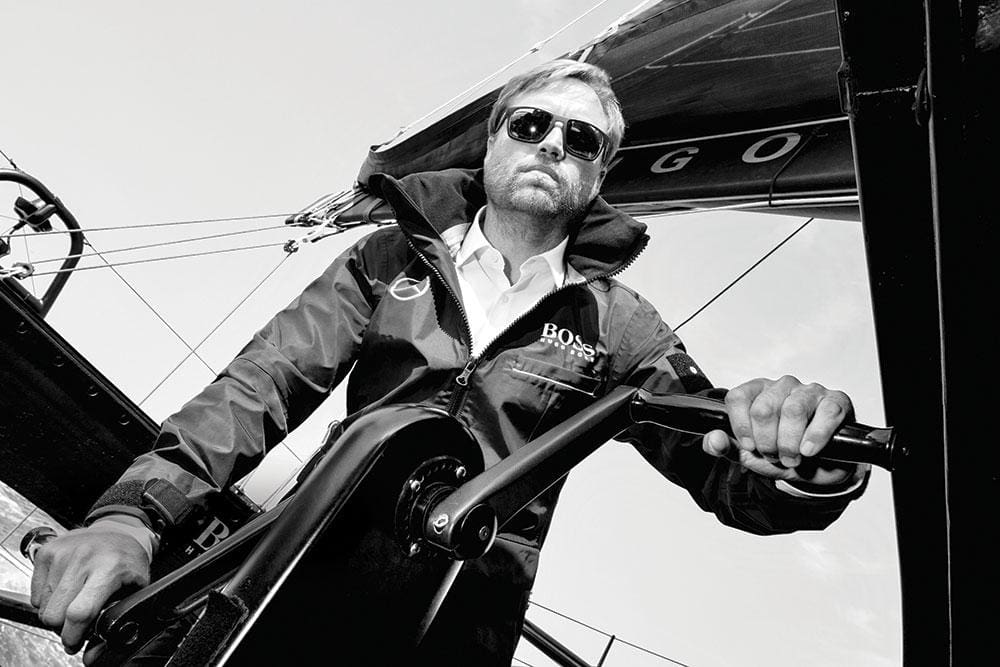
Thomson’s father was a search and rescue helicopter pilot, and as a boy he hoped to follow the same career. But a visit to the local hospital in Gosport when he was 17 revealed that his eyesight was so poor that he wouldn’t be accepted into the navy. “My grand plan was gone,” he recalls. However, the sea still beckoned. “Sailing was my hobby, and I managed to turn it into a job. When I did my first offshore race in 1995, I found my vocation. One of the things that is unique about offshore sailing is the humbling moment when you can’t see land, and you realise how small we are. That’s an experience I still love today.”
Even for an experienced sailor, says Thomson, sailing single-handed non-stop around the world is an intimidating prospect. “I’d identified that was the direction I wanted to go after I won the Clipper Round the World Race in 1998/99, and I distinctly remember my first Vendée Globe in 2004: the daunting feeling leaving the start, when all the spectator boats turn around. Fewer than 100 people have sailed solo non-stop around the world, compared with nearly 4,000 people who have gone up Mount Everest, so that gives you an idea of the scale of the difficulty.”
Mental strength, he explains, is one of the keys to his success. Of the potentially catastrophic damage to his starboard foil in the 2016 Vendée Globe, he simply says: “Stuff happens, and you have to be able to deal with it.” He works with prominent sports psychologist Ken Way. “I’ve learned that everything is relative to goals,” he says. “If your goal is to win and you don’t think you can, you’re not going to be motivated. After that foil broke, I was struggling to see where I could even finish, so I reduced my goals to simple tasks like changing a sail, or eating a bag of horrible food. As human beings, once we’ve achieved a goal, even if it isn’t particularly challenging – although I can tell you, eating a bag of food can be challenging at times – we feel better. If we feel better, we’re going to perform better.”
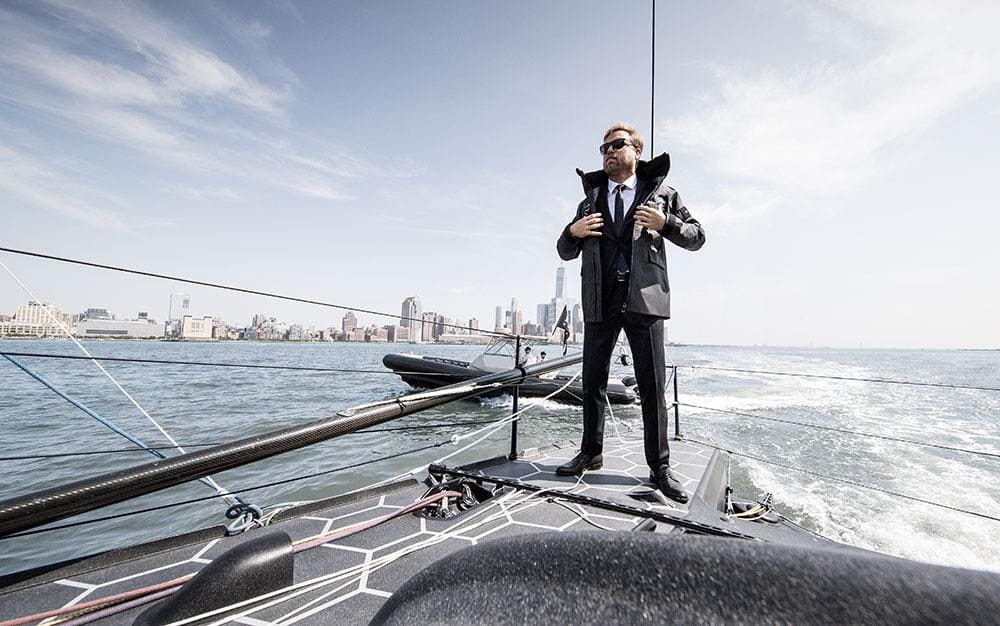
Way had asked him: “If you win the Vendée Globe, do you consider that success, and if you’re successful, would that make you happy?” – and then proceeded to explain that success doesn’t lead to happiness, but happiness leads to success. Thomson took the lesson on board – both figuratively and literally, in this instance. “If I’m in the middle of the ocean and something terrible happens, how am I going to be happy? Ken told me – and it sounds very corny – to look happy. Smile. There’s plenty of scientific evidence that shows that when we physically look happy, it rubs off mentally. I spent the whole of the last race, even when I was completely pissed off, with a massive smile on my face. I do sometimes feel like a bit of a lab rat for Ken’s experiments but it genuinely does work.”
Smiling through adversity, however, isn’t always quite enough. “My mood is completely governed by performance,” says Thomson. “When I’m not performing to my expectations, I work harder, so I forgo more sleep, I forgo food. I don’t care – I just want to get the miles back. When I’m high, doing well and feeling great, I can become complacent. It’s all about levelling emotion, staying in a position to be able to make rational, competitive decisions.”
His biggest fear, he says, is underperforming, though others might also find the loneliness overwhelming. Thomson has evolved a strategy for spending months alone in his own company. “What I’ve done over time is separate the feelings of loneliness and isolation,” he explains. “I have a lovely family, a great team, and fantastic friends, so no matter where I am I shouldn’t feel lonely – but I could feel isolated. Separating those two emotions makes it easier to deal with. Is three months a long time? If we think about what we’ve done in the past three months, we can probably only remember 10 per cent of it, and it’s gone in a flash. So to me, three months isn’t a long time. I can deal with the isolation.”
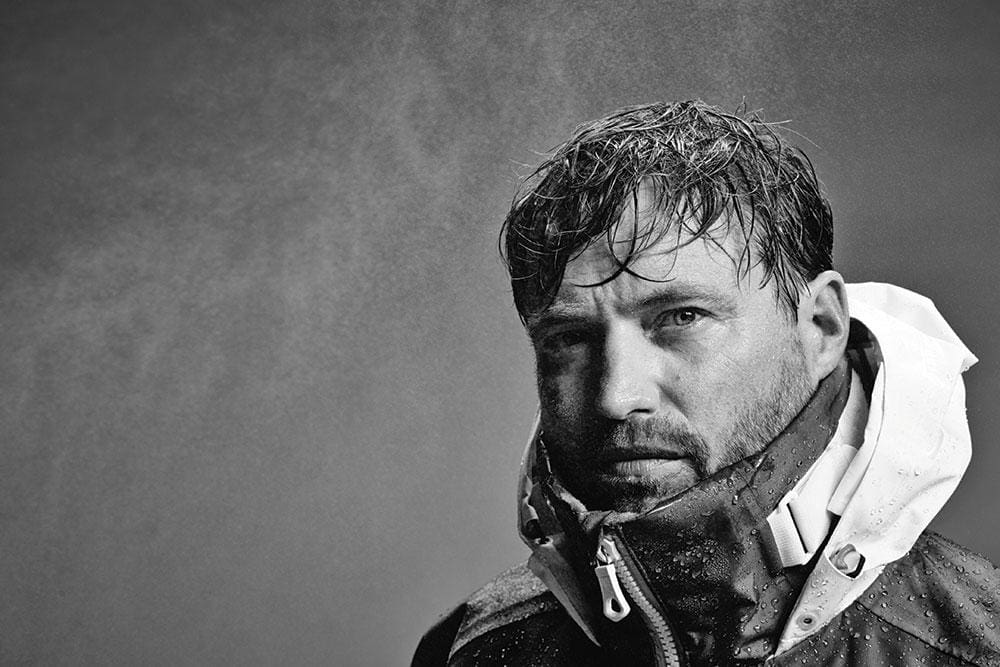
Isolation aside, has he ever been truly frightened? “I’ve had a couple of hairy moments. I was plucked from a life raft by Mike Golding [another successful British yachtsman] half way between Antarctica and Africa in 2006. Two and a half years ago I capsized 100 miles off the coast of Finisterre and I ended up being airlifted off.”
On a sailing boat, he says, when problems start, the situation can escalate very quickly. “You can have one tiny thing go wrong, then that leads to an avalanche of small things that ultimately leads to a catastrophic event. In some ways, I could be described as a risk manager. I manage enormous amounts of risk on a minute-by-minute basis out there. It’s about being in a position to recognise when these things are happening, and being able to divert or stop them.” Solo yachting, he says, is a “relentless” experience. “I have to be a meteorologist, a navigator, and a medic. There are incredible stories, like the guy who bit his tongue off during a race and had to sew it back on. Hopefully that’ll never happen to me.”
When danger threatens, there is a strong sense of camaraderie in the yachting community. “We’re all mentally very strong, big characters, all opinionated, we all like the sound of our own voices,” laughs Thomson. “We’re the fiercest competitors you’ll find in sport, but on the other hand, we’re also each other’s rescue service. I know that any of those skippers will risk or give up their lives to try and save any of the others. It’s sportsmanship, it’s respect, and it is the law of the sea. If you’re in a position to help somebody at sea and someone needs help, you are obliged. To us, that’s just normal.”
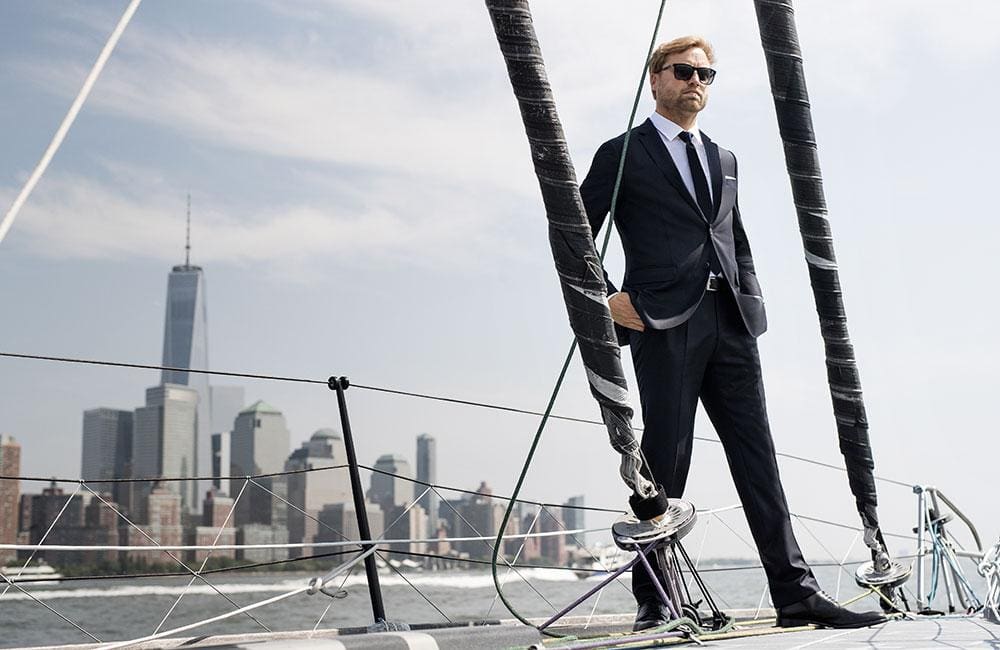
There is also the little matter of having the skill to maintain a boat – which is a highly sophisticated piece of kit. “When most people think of sailing they think it’s old-fashioned, a bit old-tech, but I love bringing people from Formula One and the aerospace industry to see the boat, because they are gobsmacked by the level of technology we use. The maximum hull thickness of my current boat is just 2.6mm. From a maintenance point of view, I have to know the boat and be able to communicate with my team when something goes wrong.”
As the yacht’s name suggests, there is a long-standing relationship between Thomson and Hugo Boss, which has supported him since before his first Vendée Globe in 2004. “As technology and the ability to communicate improves, what the sport does better and better is inspire people, and Hugo Boss is an aspirational brand,” says Thomson. Boss’s support isn’t confined to racing – Thomson also performs some extraordinary stunts in the yacht. For Skywalk, he chased the boat upwind on a kiteboard, soaring 280ft into the air before detaching from the boat and bringing the board back down to the water – all while immaculately kitted out in a Boss suit.
“The stunts are my ideas,” he says. “Hugo Boss must think I’m mad. To be given the all clear to go and do it is a massive responsibility. I feel that responsibility, and the enormous amount of trust that Hugo Boss puts in us to go and deliver.The thing I really like is that through the stunts, we are able to reach non-sailors. The whole heart of our sport is about human endeavour, about man or woman versus the elements. It’s not about technical sailing, and because of that we don’t just reach sailors.”
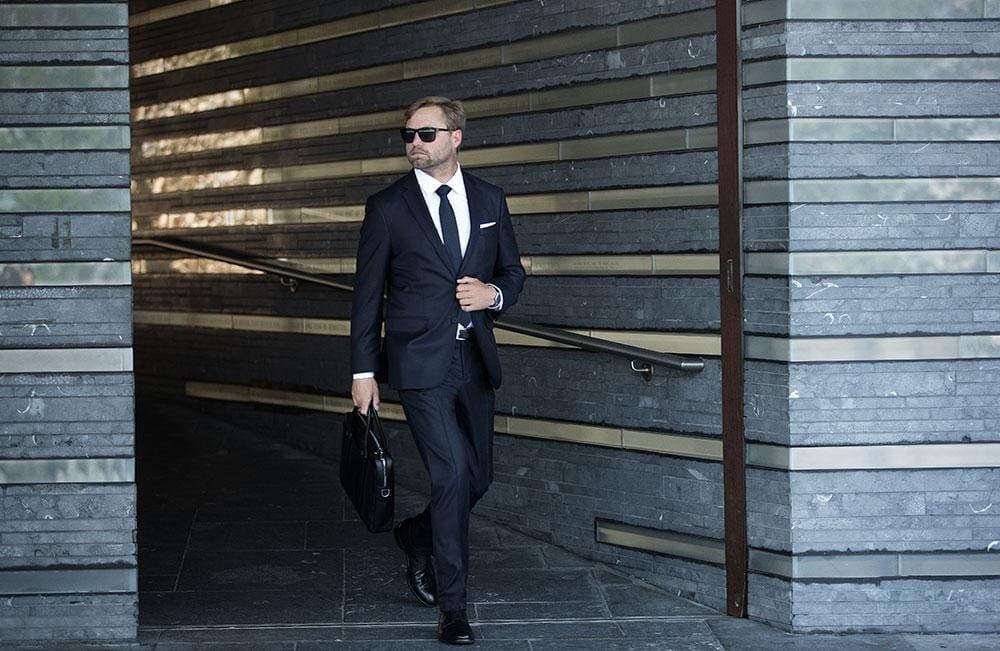
Technical or not, this is surely sailing at the highest level and preparation, says Thomson, is everything. “The race is finished before we start. It’s all to do with the people that you work with, how you manage it, your structure, and ultimately the decisions that we make together as a group. We spend a lot of energy trying to create an environment where we’re able to make the right decisions. In some ways, the race is a holiday compared to what we go through in the build-up.” When he’s on land, he says, he thinks about a million different things. “When I race, I only think about one.”
That level of preparation will stand him in good stead for the Vendée Globe 2020/21 – along with his fiercely competitive spirit. “I’m a competitive person,” Thomson admits. “When I play squash or tennis I leave with cuts and bruises. To be in a race for 24 hours a day, seven days a week, for 12 weeks is the right kind of race for me. And I get millions of euros to build what I consider the best toy in the world. It’s completely custom-made around my height, my weight, my philosophy. It’s such a privilege.” Within an hour of finishing the 2016 Vendée Globe, he told press that he would be competing again in 2020. At the official closing ceremony, he had one question for the predominantly French audience: “Are you ready to see a Brit win the race?”
alexthomsonracing.com; hugoboss.com








